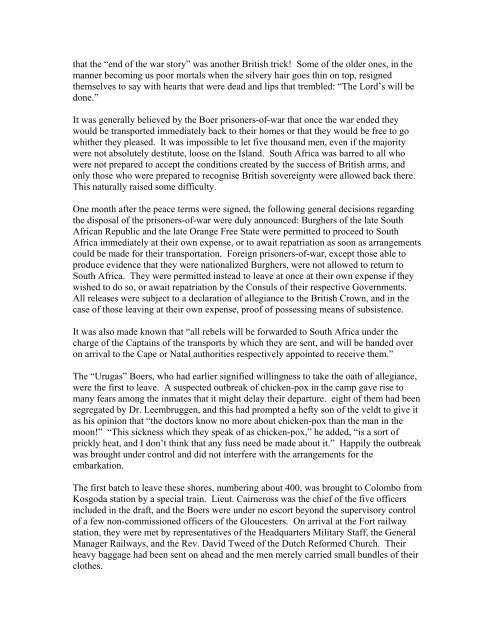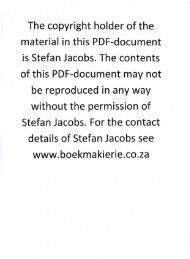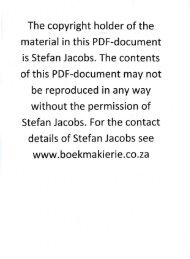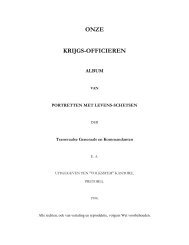Boere Krygsgevangenes in Ceylon - Boekmakierie.co.za
Boere Krygsgevangenes in Ceylon - Boekmakierie.co.za
Boere Krygsgevangenes in Ceylon - Boekmakierie.co.za
You also want an ePaper? Increase the reach of your titles
YUMPU automatically turns print PDFs into web optimized ePapers that Google loves.
that the “end of the war story” was another British trick! Some of the older ones, <strong>in</strong> the<br />
manner be<strong>co</strong>m<strong>in</strong>g us poor mortals when the silvery hair goes th<strong>in</strong> on top, resigned<br />
themselves to say with hearts that were dead and lips that trembled: “The Lord’s will be<br />
done.”<br />
It was generally believed by the Boer prisoners-of-war that once the war ended they<br />
would be transported immediately back to their homes or that they would be free to go<br />
whither they pleased. It was impossible to let five thousand men, even if the majority<br />
were not absolutely destitute, loose on the Island. South Africa was barred to all who<br />
were not prepared to accept the <strong>co</strong>nditions created by the success of British arms, and<br />
only those who were prepared to re<strong>co</strong>gnise British sovereignty were allowed back there.<br />
This naturally raised some difficulty.<br />
One month after the peace terms were signed, the follow<strong>in</strong>g general decisions regard<strong>in</strong>g<br />
the disposal of the prisoners-of-war were duly announced: Burghers of the late South<br />
African Republic and the late Orange Free State were permitted to proceed to South<br />
Africa immediately at their own expense, or to await repatriation as soon as arrangements<br />
<strong>co</strong>uld be made for their transportation. Foreign prisoners-of-war, except those able to<br />
produce evidence that they were nationalized Burghers, were not allowed to return to<br />
South Africa. They were permitted <strong>in</strong>stead to leave at once at their own expense if they<br />
wished to do so, or await repatriation by the Consuls of their respective Governments.<br />
All releases were subject to a declaration of allegiance to the British Crown, and <strong>in</strong> the<br />
case of those leav<strong>in</strong>g at their own expense, proof of possess<strong>in</strong>g means of subsistence.<br />
It was also made known that “all rebels will be forwarded to South Africa under the<br />
charge of the Capta<strong>in</strong>s of the transports by which they are sent, and will be handed over<br />
on arrival to the Cape or Natal authorities respectively appo<strong>in</strong>ted to receive them.”<br />
The “Urugas” Boers, who had earlier signified will<strong>in</strong>gness to take the oath of allegiance,<br />
were the first to leave. A suspected outbreak of chicken-pox <strong>in</strong> the camp gave rise to<br />
many fears among the <strong>in</strong>mates that it might delay their departure. eight of them had been<br />
segregated by Dr. Leembruggen, and this had prompted a hefty son of the veldt to give it<br />
as his op<strong>in</strong>ion that “the doctors know no more about chicken-pox than the man <strong>in</strong> the<br />
moon!” “This sickness which they speak of as chicken-pox,” he added, “is a sort of<br />
prickly heat, and I don’t th<strong>in</strong>k that any fuss need be made about it.” Happily the outbreak<br />
was brought under <strong>co</strong>ntrol and did not <strong>in</strong>terfere with the arrangements for the<br />
embarkation.<br />
The first batch to leave these shores, number<strong>in</strong>g about 400, was brought to Colombo from<br />
Kosgoda station by a special tra<strong>in</strong>. Lieut. Cairncross was the chief of the five officers<br />
<strong>in</strong>cluded <strong>in</strong> the draft, and the Boers were under no es<strong>co</strong>rt beyond the supervisory <strong>co</strong>ntrol<br />
of a few non-<strong>co</strong>mmissioned officers of the Gloucesters. On arrival at the Fort railway<br />
station, they were met by representatives of the Headquarters Military Staff, the General<br />
Manager Railways, and the Rev. David Tweed of the Dutch Reformed Church. Their<br />
heavy baggage had been sent on ahead and the men merely carried small bundles of their<br />
clothes.





